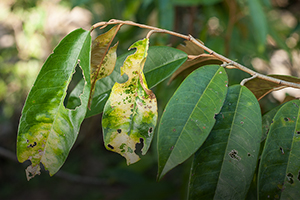Gene-Inhibiting Sprays
 Plant viruses have been the target of genetic research for decades due to the tremendous threat that they pose to global food security. Genetic modification has allowed for the development of many crops that are resistant to disease. But creating new crop varieties by altering their DNA takes years, so recent research has focused on achieving the same goal using sprays.
Plant viruses have been the target of genetic research for decades due to the tremendous threat that they pose to global food security. Genetic modification has allowed for the development of many crops that are resistant to disease. But creating new crop varieties by altering their DNA takes years, so recent research has focused on achieving the same goal using sprays.
In the first study of its kind to be published, Australian scientists have reported successfully silencing viral genes within tobacco plants for up to 20 days using a technique called RNA interference (RNAi). RNA strands from specific-disease causing organisms are mixed with clay nanoparticles to produce a substance dubbed BioClay. When sprayed on the plants, the clay particles react with carbon dioxide to release the RNA slowly over time, triggering a protective response that blocks the virus from replicating.
The research could have a profound effect on the future of farming by enabling farmers to make crops more drought-resistant, boost yields, and trigger ripening simply by spraying them. The biggest current obstacle is that RNA is very expensive to replicate; however, companies are already working on getting the cost for a gram of RNA (enough to treat a small field) down from more than $100,000 a few years ago to under $2. If successful, BioClay could be the answer to residue-free, sustainable farming.
For information: Neena Mitter, University of Queensland, Centre for Plant Science, Brisbane, St. Lucia, Queensland 4072, Australia; phone: +61-7334-66513; email: n.mitter@uq.edu.au; Web site: http://www.uq.edu.au/